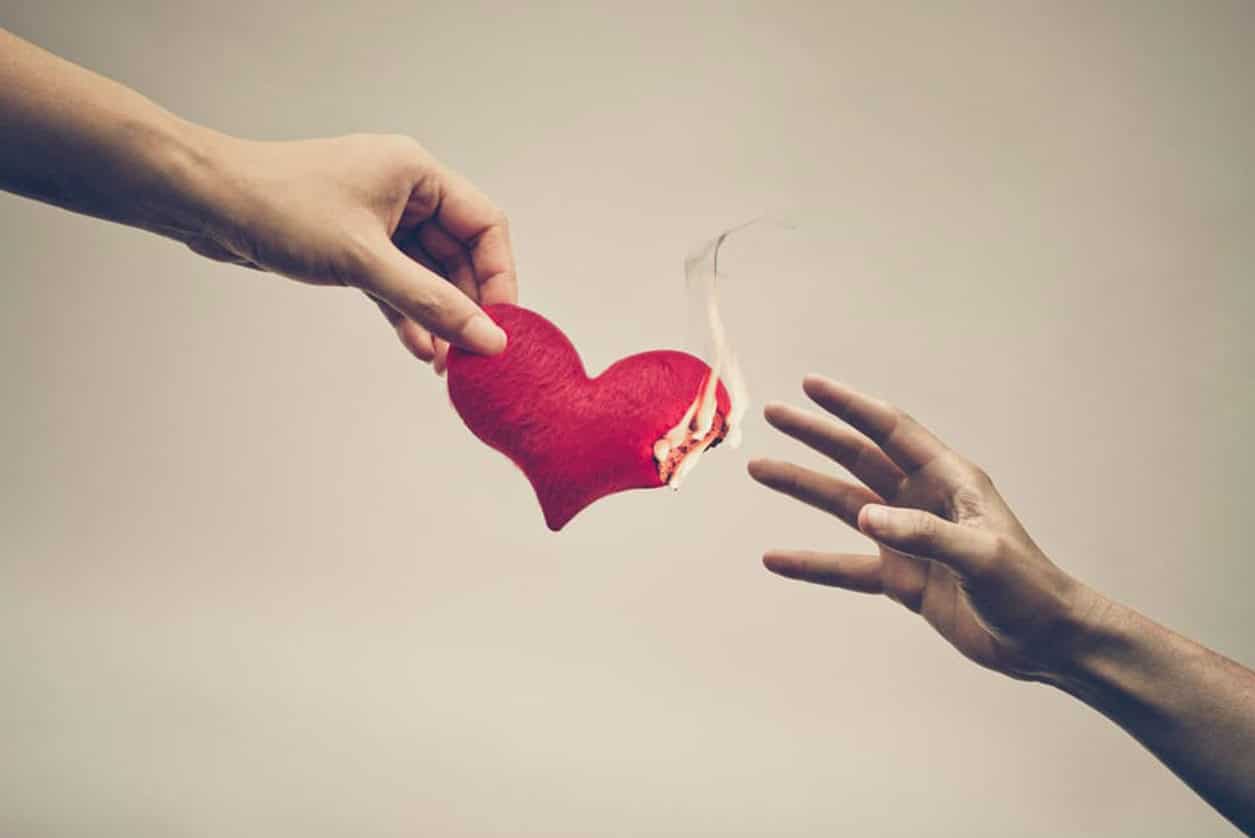Anyone who’s gone through a painful breakup or divorce knows the grief that hits can often feel like a dark prison. You may look for all sorts of distractions only to find that the moment your head hits the pillow the pain is overwhelming. There’s a whole process to go through when we separate from another human that we’ve shared a life with. You may find yourself questioning everything, beating yourself up about every little thing you could have done differently or even feeling like you’ll be alone forever.
Trust me, I’ve been through a divorce and seen enough breakups in my community to know that believing you’ll never find someone again is just a really “real feeling” phase the mind goes through when newly single. Not everyone will have this experience, but generally if you’re the one who’s been broken up with, or if you’ve been cheated on or betrayed, these thoughts can creep in.
Let this sink in: you’re not alone. When I started seeing how often people (mainly women) believed they would be alone forever after a breakup, I felt relief. I realized it’s is just a phase. This discovery excited me because knowing that having these thoughts was a normal part of the journey also meant they would eventually come to an end.
Part of a divorce means separating not only physically, but often involves other complicated matters like adjusting to new financial changes, moving and the worst part sometimes losing friends. In an ideal world, you can use your divorce or breakup as an opportunity for growth rather than a reason to further demonize your ex-partner and remain a victim of your circumstances.
Sounds harsh? Possibly, but consider this. Relationship patterns are deeply engrained in us, and the longer we ignore the common denominator in all of our relationship issues (ourselves) the more pain we’re going to have to go through. Why is this? Because until we recognize our own patterns and become self-aware enough to transform our inner world, we’ll likely attract the same lessons in relationships over and over.
I have a teacher who often says, “from a distance you see rubies and diamonds and the closer you get they turn to blood and tears”. This is a metaphor for how most relationships start. From a distance, we see our new partner as a model of perfection, they couldn’t possibly be anything like the last one. It was the person that was the problem, not the pattern. This is false.
Fortunately we don’t have to repeat old patterns in relationships that don’t serve us, leave us feeling unloved, betrayed, or disrespected. My divorce was one of the most instrumental catalysts for positive change in my life, and it can be for you to.
1. Get to Know Your Grief
Find a healthy way to understand the grief you’re experiencing. You may be temped to bypass this and find ways to distract yourself. There’s a balance here. Healthy distractions can at times be a good way for you to move forward but at the same time, you cannot ignore your pain all together. Your pain is trying to teach you something.
Often in divorce we’re offered a second chance to take a look at our past wounds and old stuff from childhood that may not have been dealt with. Find a qualified support person who isn’t a family member or friend to do this work with. You can contact me for coaching or to ask for a referral to a trusted therapist.
2. Ask for Support
Figure out what you need and ask for it. When I was going through my divorce which also happened to be an extra-painful but unfortunately not so rare circumstance, I found it difficult to feed myself. I asked a friend to come over and help me prepare meals for me and to remind me to do stuff like you know, get out of bed and shower.
Do your best not to ask your friends or family to take sides and instead, get support on your individual process. As difficult as this may be, in the end this will serve you deeply in your healing. Regardless of what the other person is doing or saying, try to remain focused on your own experience. Remember that breakups and divorce impact the entire community, not just the two of you. The reality is, if you’re divorcing on the grounds of abuse or unacceptable behavior, energy will dictate which relationships stay and go from your life. Sometimes you just have to trust that those meant to come along with you on your journey ahead will, and the rest will fall away.
3. Stop Blaming Yourself
There’s always something we could have, should have, or would have done. You cannot change the past, so don’t waste your mental energy punishing yourself for things you can’t do anything about. While reflection is needed in order to create positive change in our lives, your focus needs to be on how to move forward rather than dwelling on the past. Sometimes we forget that it’s ok to be human. You did the best you could with what you had at the time, so did your partner. Forgive yourself first and foremost.
4. Be of Service
When you can, find some way to give back or get involved in your community. There were times when I found being of service impossible throughout my process because I really needed to take all of my energy and bring it inward, and other times where I just needed something to remind just how blessed I truly was, even in my darkest hour. You know yourself best, so find a way to feel valuable and give back. Be of service without giving more than you have in you at the moment. Maybe it’s as simple as doing a kind-deed, or perhaps it’s volunteering at a soup kitchen, reading to elders or organizing a food drive.
5. Read Books
Find books that you can turn to when you’re alone and there’s no one to talk to. In moments where you feel desperate, create a relationship with your own process. I chose the book “The Journey from Abandonment to Healing” by Susan Anderson.
Choose content that will support you in getting to know yourself better and develop healthy communication between your adult self and your inner child. Another option is “Embracing the Beloved” by Stephen and Ondrea Levine. This book is a teaching on Conscious Relationship, which is firstly about the relationship with yourself.
Read books about relationships while going through a divorce you say? I do say indeed! I went on a tangent during my separation because I was sure about one thing: I wanted my next relationship to be different, and I wanted it to last. We also tend to question our paths and direction in life when a huge life change occurs, so it’s the perfect time to get more clear on what you do want in a relationship vs. what you don’t.
6. Set Boundaries
Do you have strong boundaries? Properly taking care of yourself means setting some and sticking with them. For example, if you’re ending a relationship that was unhealthy in a variety of ways you may need to set a boundary with your ex as to how you will both communicate while you go through your divorce. Unless you are both willing and able to go into a container of healing together, you may be better served by creating a limited contact agreement.
In break-ups, the no contact rule is generally enforced if one or both people really need support in moving past the break-up. Divorce is more complicated, you may have to communicate either temporarily or if you have children, for the rest of your lives. In these cases, it’s wise to create agreements so each person feels safe and respected. If possible, finding a therapist or counsellor to support you individually and together can be a wise move.
7. Try Something New
When your whole life is changing, you may be trying to grasp on to anything that feels the same, but in order to break patterns and create a new life you’ve got to try new things, fun things! It may be difficult at first, but do something that’s outside of your comfort zone. Find a dance class, take up yoga or fitness training, get involved in a book-club, go sky-dive. Do something that reinforces your individuality and reminds you that you are responsible for creating your life, not someone else. By going out and doing new things, you are creating a life of rich experiences for yourself. This helps to build up your self-esteem and give you a sense of independence while you heal.
8. Create New Patterns that Make You Feel Safe and Secure
Feeling safe is a natural human need and when we lose our partner or a relationship ends, our safety and security can feel threatened. While we can often have a tendency to seek for that feeling outside of ourselves, during a divorce there’s a big opportunity for learning how to self-soothe. Look at the ways in which you can create a sense of safety and security for yourself. This may look like creating a ritual for yourself every morning or night that you can always turn to for consistency. It could look like setting up a weekly phone call with one of your parents or friends.
In addition to finding new ways to create safety and security for yourself, I’ll mention that this is an excellent time to heal old relationships with family members as well. If you had a tough relationship with your mom or dad you could potentially use this as a chance to get closer to them by giving them a call when you’re feeling sad and letting them support you. Knowing you have people in your corner only adds to the feeling of being safe and secure.
9. Use This Opportunity for Inner Change
In the past I’ve written about how my divorce unlocked unhealed childhood trauma. This is true for many of us in a variety of ways. Understandably, looking at the stuff we’ve suppressed for most of our lives is difficult and you have the urge to avoid it. Without this action though, we’re bound to run into similar troubles in the future. During a shake-up like divorce, there’s an opportunity to do some deep inner work on yourself to become a better, more empowered version of yourself. Remember, you did the best with what you had at the time, but you don’t have to stay there. As we grow, we can choose to learn and step more fully into our truth. This takes courage and commitment, honesty, self-forgiveness and self-acceptance. Read my story next if you’re interested in hearing how I learned from my divorce:

